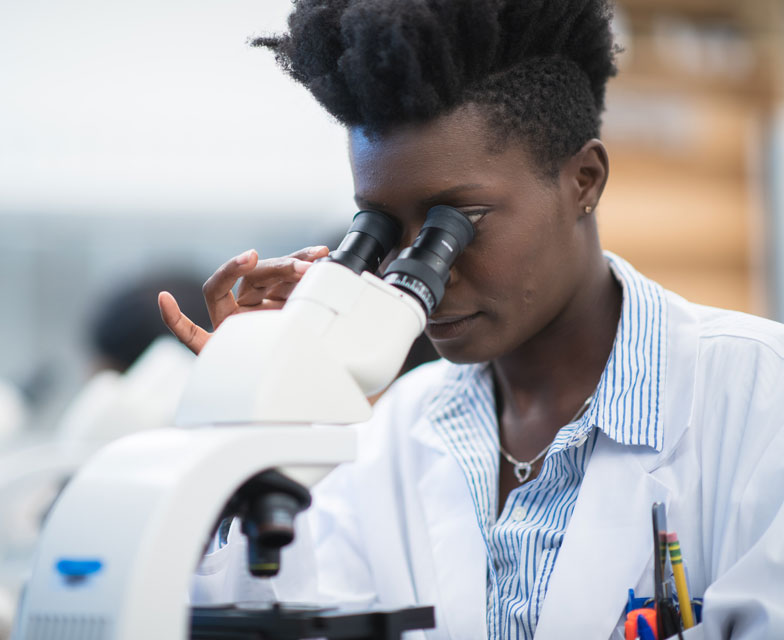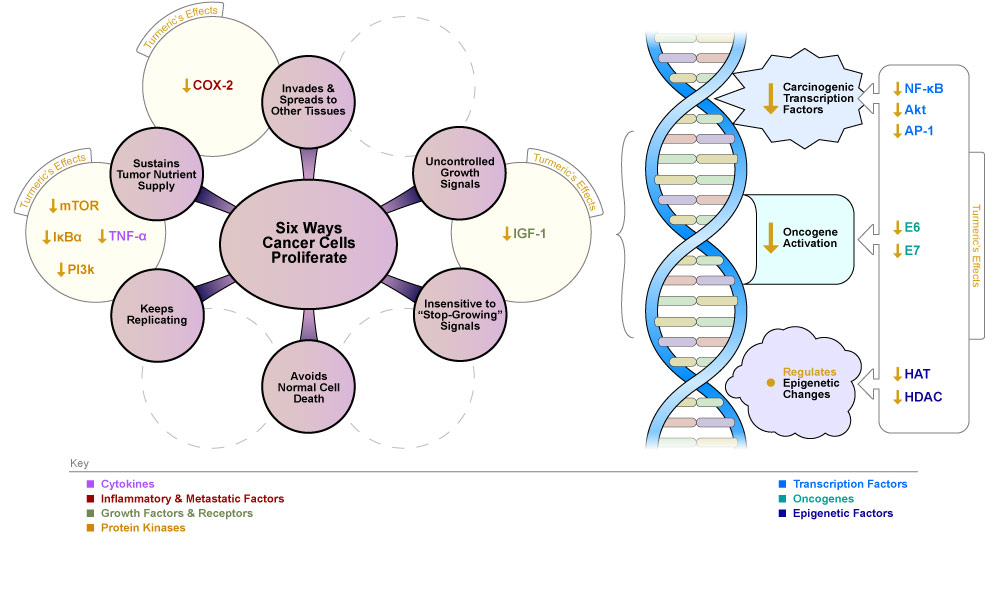Can Turmeric Compounds Help Prevent and Treat Cervical Cancer?

Research suggests that turmeric compounds could help prevent cervical cancer, one of the most common types of cancers in women. For patients with stage II to stage IV cervical cancer, conventional treatment is typically chemotherapy drugs and radiation. (vi.255, 256)
Curcumin from turmeric may also be helpful in treating cervical cancer. For patients with stage II to stage IV cervical cancer, conventional treatment is typically chemotherapy drugs and radiation. However, in these later stages cervical cancer often doesn't respond to conventional therapy. One of the reasons is that tumors develop resistance to the best chemotherapy drugs (e.g., paclitaxel) for killing cervical cancer cells. Studies suggest that the turmeric compound could help overcome this chemoresistance. (vi.255, 257)
Causes and Risk Factors for Cervical Cancer
Cervical cancer most often occurs in women younger than 50. It is much less common in developed countries, most likely due to extensive Pap screening tests that catch abnormal cervical cells before they advance to cancer or before malignant cells become invasive. (vi.256)
Infection with certain strains of human papillomaviruses (HPV) can lead to cervical cancer. Not all women infected with HPV will develop cancer. However, cervical cancer is almost always caused by infection from high-risk types of HPV, combined with personal risk factors such as: (vi.240, 256, 258, 259)
- Compromised immune system.
- Family history of cervical cancer.
- High number of sexual partners (or partners who have been promiscuous).
- HIV infection.
- Metabolic syndrome.
- Poor diet.
- Smoking.
In India, 70-90% of cervical cancer cases have been linked to HPV type 16, and this holds true worldwide. HPV 16 and 2 other high-risk types (HPV 18 and 45) cause over 90% of the more aggressive and invasive cervical adenocarcinoma. An additional 5 types of HPV are also termed high-risk and are known to cause cervical cancer. (vi.240, 256, 258, 259)
Some types of HPV are termed low-risk types since they only cause less invasive, low-grade lesions. Low risk types of HPV are those linked to genital warts. (vi.256)
Turmeric May Help Lower the Risk of Cervical Cancer
Numerous preclinical studies suggest that turmeric and its compounds could help lower the risk of cervical cancer. In one clinical trial, dietary curcumin supplements improved precancerous lesions of the cervix in a patient. (vi.179, 213, 256, 258-260)
In addition to turmeric's antioxidant and anti-inflammatory effects, turmeric compounds may also be able to prevent or treat conditions associated with higher risk of cervical cancer. These include metabolic syndrome and sexually transmitted diseases (STDs). (vi.179, 213, 256, 258-260)
Turmeric Compounds Boost the Immune System and Block STDs
Turmeric and curcumin, the yellow pigment compounds in turmeric, could help prevent STDs associated with increased risk of cervical cancer. For example, curcumin blocks activation of 2 oncogenes by high-risk types of HPV that transform infected cells into malignant cervical cancer. (vi.258)
Topical Herbal Prevention for Cervical Cancer?
Basant, a cream that contains curcumin from turmeric and other herbs, may be able to prevent STDs. Lab studies show it prevents HPV (mostly transmitted sexually) from infecting cervical cells. It's currently being tested in a clinical trial for effectiveness and safety in infected women with precancerous lesions in the cervix. Basant also inhibits Candida fungal infections, HIV-1, and the bacteria that cause gonorrhea (in lab experiments). (vi.256, 259)
Research suggests that turmeric and its compounds could boost the immune system in people already infected with HIV. Why is this important? HIV-positive status is associated with higher rates of HPV infection. Further, these rates are even higher in those with worse immune system suppression. Statistics indicate that there are 5 times more cases of cervical cancer in women who are HIV-positive than in HIV-negative women. (vi.93, 256)
In the lab, curcumin and turmerin from turmeric blocks production of proteins that the HIV virus needs to replicate and infect cells. Animal studies and lab experiments show that many of the compounds in turmeric also inhibit herpes infections. This includes type 2 herpes (HSV-2), which activates HIV and HPV-18 viral genes. Researchers suggest HSV-2 may increase risk of HIV and HPV infections and suppress the immune system. HSV-2 also promotes the transformation of an infected cell into cancer. (vi.261-263)
In one study, turmeric, curcumin, and turmerin enhanced the effectiveness of the anti-HIV drug AZT. Reducing the number of infected cells can slow down HIV's suppression of the immune system, potentially reducing the risk of HPV infection and cervical cancer. (vi.26, 262, 264, 265)
Reducing Increased Risks for Cervical Cancer from Metabolic Syndrome with Turmeric
In a long-term follow up study, patients with metabolic syndrome had a 26% higher risk of cervical cancer. Research suggests that compounds in turmeric could help prevent and treat conditions included in metabolic syndrome: (vi.213, 237, 260, 266)
- Obesity (12% higher risk, possibly due to increased persistence of HPV infection). (vi.260)
- Diabetes (in women over age 70). (vi.260)
- High blood pressure (25% higher risk). (vi.260)
- High triglyceride cholesterol levels (39% higher risk, especially in women aged 50-70 and for squamous cell type of cervical cancer). (vi.260)
Enhancing Treatment for Cervical Cancer with Turmeric
By themselves, studies show that the curcumin compounds in turmeric kill cervical cancer cells. In fact, a vaginal cream based on the turmeric compound curcumin has been recently developed as a cervical cancer therapy. When tested in the lab and animals, it successfully eliminated HPV infected cervical cancer cells. (vi.258, 267)
Turmeric's curcumin causes mitotic catastrophe to block the growth of cervical cancer cells. Curcumin is especially effective in triggering apoptosis death of cervical cancer cells infected with high-risk HPV. (vi.174, 258)
Lab and animal studies show turmeric curcumin compounds stimulate natural antioxidants while blocking multiple inflammatory proteins and oncogenes that promote cervical cancer: (vi.51, 67, 134, 179, 255, 258)

How Turmeric's Curcumin Compounds Stop Cervical Cancer Cells
Turmeric Helps Chemotherapy for Cervical Cancer Work Better
Turmeric compounds could help increase the effectiveness of conventional cervical cancer therapy, according to some researchers. Studies show that the turmeric compound curcumin and its metabolites help make cervical cancer cells more sensitive to chemotherapy. They reduce chemoresistance and enhance treatment effectiveness in a number of chemotherapy drugs: (vi.255, 257)
- 5-Fluorouracil (5-FU)
- Cisplatin
- Etoposide
- Mitoxantrone
- Vinblastine
The turmeric compound also improved the effectiveness of Taxol® in killing cervical cancer cells. In animal studies, combining curcumin with paclitaxel enhanced the drug's antitumor activity. Both the number and size of cervical tumors were reduced more with the combination therapy. Lab studies show pre-treating cervical cancer cells with curcumin increased their sensitivity to radiation therapy. (vi.2, 134)
Curcumin Boosts Anticancer Virus Activity
Have you ever heard of using a virus to treat cancer? Well, researchers have discovered that Vesicular Stomatitis Virus (VSV) could help kill cervical cancer cells. VSV causes nasal lesions in domestic and farm animals, but has very low ability to infect humans. (vi.487)
But tumor cells are susceptible to VSV infection. Moreover, VSV triggers tumor cell death. (vi.487)
Still, some cancer cells are resistant to infection. In a recent lab study, scientists tested a number of safe, natural substances to see if they could enhance VSV's antitumor capabilities. Most showed no effect, but curcumin effectively sensitized resistant cervical cancer cells to VSV. (vi.487)
Other Turmeric Compounds That May Help Block Cervical Cancer
In addition to curcumin and turmerin, turmeric contains phytochemicals and nutrients that research suggests could also help prevent cervical cancer. These include:
| Turmeric Compound | Effects |
|---|---|
|
Question: How can caffeic acid help fight cervical cancer? Answer: Studies show caffeic acid has the following effects that may help prevent or treat cervical cancer:
|
|
|
Question: How can eugenol help fight cervical cancer? Answer: Studies show eugenol has the following effects that may help prevent or treat cervical cancer:
|
|
|
Question: Can folate help fight cervical cancer? Answer: Studies show that folate may help prevent cervical cancer. (vi.270) |
|
|
Question: How can quercetin help fight cervical cancer? Answer: Studies show quercetin has the following effects that may help prevent or treat cervical cancer:
|
|
|
Question: Can vitamin C help fight cervical cancer? Answer: Vitamin C is a potent antioxidant that quenches DNA-damaging free radicals. Research suggests it could also help reduce high blood pressure and treat unhealthy cholesterol levels. (vi.270) |
Join the 1000s of People Who Are Discovering the Benefits of Turmeric.

Healthceuticals® Turmeric Curcumin Complex
100% Certified
Organic ingredients
- Organic Turmeric Extract - standardized to 95% curcuminoids.
- Organic Whole Turmeric - provides full spectrum antioxidant, anti-inflammatory turmeric benefits, including turmerones and numerous vitamins, minerals, and phytonutrients
- Organic Black Pepper Extract - standardized to 95% piperine; dramatically enhances bioavailablity.
- Organic Phospholipids - markedly improve absorption.
- Organic Ginger - works synergistically with turmeric to provide more powerful benefits.
- Absolutely FREE of potentially harmful additives and fillers such as magnesium stearate.




